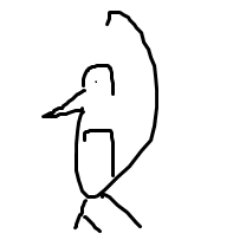結果
| 問題 | No.160 最短経路のうち辞書順最小 |
| コンテスト | |
| ユーザー |
 puru puru
|
| 提出日時 | 2016-06-15 21:39:00 |
| 言語 | C++14 (gcc 15.2.0 + boost 1.89.0) |
| 結果 |
AC
|
| 実行時間 | 16 ms / 5,000 ms |
| コード長 | 4,150 bytes |
| 記録 | |
| コンパイル時間 | 1,467 ms |
| コンパイル使用メモリ | 132,008 KB |
| 実行使用メモリ | 6,820 KB |
| 最終ジャッジ日時 | 2024-10-11 05:15:13 |
| 合計ジャッジ時間 | 2,676 ms |
|
ジャッジサーバーID (参考情報) |
judge1 / judge4 |
(要ログイン)
| ファイルパターン | 結果 |
|---|---|
| sample | AC * 4 |
| other | AC * 26 |
ソースコード
#include <cctype>
#include <cerrno>
#include <cfloat>
#include <ciso646>
#include <climits>
#include <clocale>
#include <cmath>
#include <csetjmp>
#include <csignal>
#include <cstdarg>
#include <cstddef>
#include <cstdio>
#include <cstdlib>
#include <cstring>
#include <ctime>
// C++
#include <algorithm>
#include <bitset>
#include <complex>
#include <deque>
#include <exception>
#include <fstream>
#include <functional>
#include <iomanip>
#include <ios>
#include <iosfwd>
#include <iostream>
#include <istream>
#include <iterator>
#include <limits>
#include <list>
#include <locale>
#include <map>
#include <memory>
#include <new>
#include <numeric>
#include <ostream>
#include <queue>
#include <set>
#include <sstream>
#include <stack>
#include <stdexcept>
#include <streambuf>
#include <string>
#include <typeinfo>
#include <utility>
#include <valarray>
#include <vector>
using namespace std;
#define all(c) ((c).begin()), ((c).end())
#define dump(c) cerr << "> " << #c << " = " << (c) << endl;
#define iter(c) __typeof((c).begin())
#define tr(i, c) for (iter(c) i = (c).begin(); i != (c).end(); i++)
#define REP(i, a, b) for (int i = a; i < (int)(b); i++)
#define rep(i, n) REP(i, 0, n)
#define mp make_pair
#define fst first
#define snd second
#define pb push_back
#define debug( fmt, ... ) \
fprintf( stderr, \
fmt "\n", \
##__VA_ARGS__ \
)
typedef unsigned int uint;
typedef long long ll;
typedef unsigned long long ull;
typedef vector<int> vi;
typedef vector<ll> vll;
typedef vector<vll> vvll;
typedef vector<vi> vvi;
typedef vector<double> vd;
typedef vector<vd> vvd;
typedef vector<string> vs;
typedef pair<int, int> pii;
typedef pair<ll, ll> pll;
const int INF = 1 << 29;
const double EPS = 1e-10;
double zero(double d) {
return d < EPS ? 0.0 : d;
}
template<class T>bool chmax(T &a, const T &b) { if (a<b) { a=b; return true; } return false; }
template<class T>bool chmin(T &a, const T &b) { if (b<a) { a=b; return true; } return false; }
#define UNIQUE(v) v.erase( unique(v.begin(), v.end()), v.end() );
template<typename T1, typename T2>
ostream &operator<<(ostream &os, const pair<T1, T2> &p) {
return os << '(' << p.first << ',' << p.second << ')';
}
template<typename T>
ostream &operator<<(ostream &os, const vector<T> &a) {
os << '[';
rep(i, a.size()) os << (i ? " " : "") << a[i];
return os << ']';
}
string toString(int i) {
stringstream ss;
ss << i;
return ss.str();
}
const int MOD = 1000000007;
// a^k
ll fpow(ll a, ll k, int M) {
ll res = 1ll;
ll x = a;
while (k != 0) {
if ((k & 1) == 1)
res = (res * x) % M;
x = (x * x) % M;
k >>= 1;
}
return res;
}
struct prepare {
prepare() {
cout.setf(ios::fixed, ios::floatfield);
cout.precision(8);
ios_base::sync_with_stdio(false);
}
} _prepare;
struct edge{
int to, cost;
};
vi dijkstra(int start, vector< vector<edge> >& graphs) {
priority_queue<pii, vector<pii>, greater<pii> > que;
vi d(graphs.size(), INF);
d[start] = 0;
que.push(mp(0, start));
vi prev(graphs.size(), -1);
while(!que.empty()){
pii p = que.top(); que.pop();
int v = p.second;
if(d[v] < p.first)
continue;
tr(it, graphs[v]) {
if(d[it->to] > d[v] + it->cost || (d[it->to] == d[v] + it->cost && prev[it->to] > v)) {
d[it->to] = d[v] + it->cost;
que.push(mp(d[it->to], it->to));
prev[it->to] = v;
}
}
}
return prev;
}
int main() {
int N, M, S, G;
cin >> N >> M >> S >> G;
vector< vector<edge> > graphs(N);
rep(i, M) {
int a, b, c;
cin >> a >> b >> c;
graphs[a].push_back(edge{b,c});
graphs[b].push_back(edge{a,c});
}
vi prev = dijkstra(G, graphs);
cerr << prev << endl;
int now = S;
vi res;
while(now != -1) {
res.push_back(now);
now = prev[now];
}
rep(i, res.size()) {
if(i != 0)
cout << " ";
cout << res[i] ;
}
cout << endl;
return 0;
}
